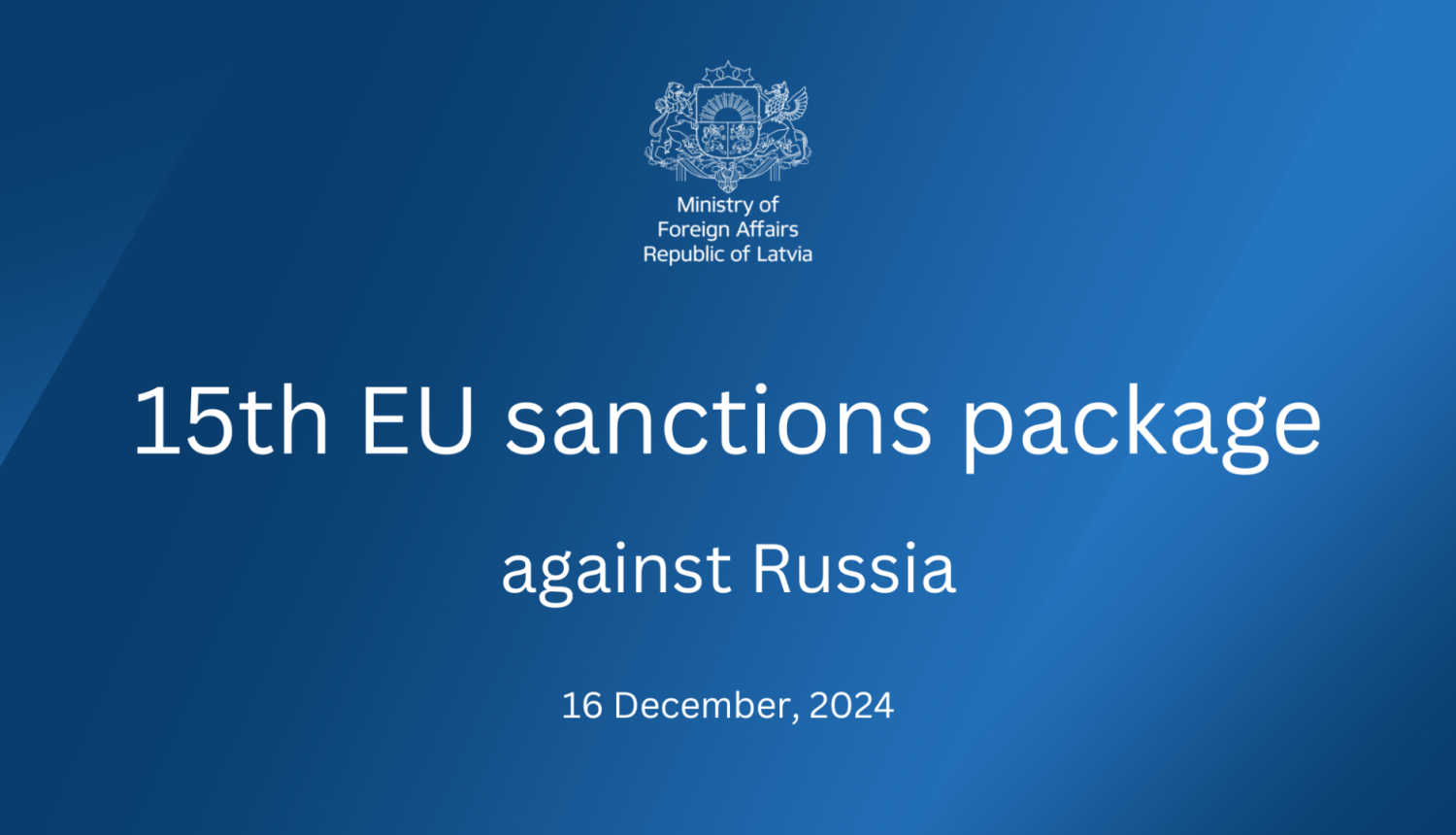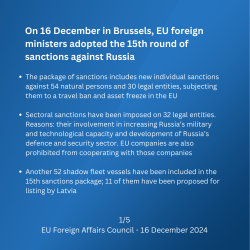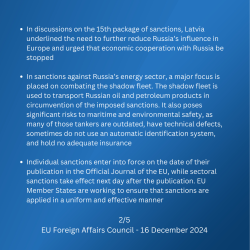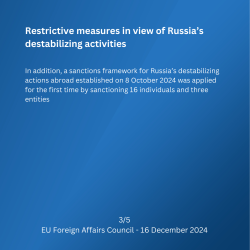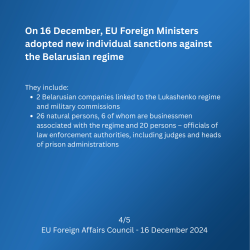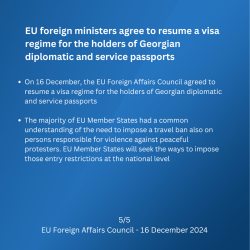On Monday, 16 December 2024, at the EU Foreign Affairs Council, ministers approved the 15th package of sanctions against Russia, including the listing of 52 shadow fleet vessels, 11 of which have been proposed for designation by Latvia. Oil and natural gas, which is mostly exported by Russia by means of the shadow fleet, remain a major source of its income. In addition, the shadow fleet poses significant environmental risks, with many of the tankers being technically outdated and uninsured. The EU’s 15th package of sanctions also includes restrictive measures against 84 individuals and companies involved in increasing Russia’s military and technological capabilities or developing Russia’s defence and security sector. The decision has already been published in the Official Journal of the EU, and the sanctions entered into force on 16 December.
In addition, at the Foreign Affairs Council, individual sanctions were imposed on 16 natural persons and three legal entities related to Russia’s hybrid activities. The EU foreign ministers also adopted individual sanctions against the Belarusian regime – 26 individuals and two legal entities.
The Minister for Foreign Affairs, Baiba Braže: “This was the first EU Foreign Affairs Council chaired by the new High Representative of the Union for Foreign Affairs and Security Policy, Kaja Kallas, and it was productive: we have approved the 15th sanctions package against Russia. And if there were no ships on the EU sanctions list at the beginning of the year, the transatlantic coalition has now sanctioned 118 shadow fleet vessels. This has been achieved in close cooperation with other EU countries, the UK and the United States. Individual sanctions have also been imposed on 28 Belarusian legal and natural persons, which is noteworthy in the context of the upcoming presidential “elections” in January 2025. As regards Georgia, a political agreement was reached on the renewal of the Schengen visa requirement for holders of diplomatic and service passports. Latvia has so far actively supported the imposition of sanctions on officials of the Georgian government and will continue to do so, as well as offering further support to Georgian society – young people, independent media, NGOs – all those who have expressed support for Georgia’s integration with the EU.”
Baiba Braže called on foreign ministers to urgently prepare proposals for the 16th package of EU sanctions, which are expected to be approved as early as the first quarter of next year. “Russia’s economy is Putin’s vulnerable point, and EU Member States must stop any investment and business in Russia. Sanctions are working, and the EU needs to continue its sanctions pressure on the energy and gas sectors, which are Russia’s main source of funding. The transfer to Russia of any technological solutions it uses in the war of aggression against Ukraine must be stopped. Russia’s access to global contacts with third countries, which it uses to evade or circumvent sanctions, must also be limited,” Baiba Braže called on the Council.
Ministers were addressed by the Ukrainian Foreign Minister, Andrii Sybiha, in a video format, who briefed them about the current situation and the most pressing military needs, including air defence systems to protect nuclear power stations. Ukraine’s Foreign Minister stressed: “Military support is needed today because it may be too late tomorrow.” He also pointed out that Russia was not as strong as it seemed, and every effort had to be made to break it.
Minister Braže underlined: “Military support is critical to ensuring that Ukraine has the best possible positions on the battlefield. Only that way will Ukraine have better positions of power in possible peace talks.”
In a discussion on developments in the Middle East, ministers pointed out that the collapse of Assad’s brutal regime was an opportunity for stability and security for Syria and the region as a whole, as well as ensuring fundamental rights for the population. The first statements by the representatives of the Organisation for the Liberation of the Levant (known as HTS, Hayat Tahrir al-Sham), which has taken power in Syria, and their commitment to preserving the country’s administrative structures should be approached with a cautious optimism.
Quick facts
• The sanctions target 84 natural and legal persons, including North Korean officials and Chinese companies producing drones for Russia;
• 52 Russian “shadow fleet” vessels sanctioned;
• The sanctions target 16 individuals and three companies involved in Russian hybrid activities;
• 26 natural persons and two Belarusian companies sanctioned for violations of human rights and democracy in Belarus;
• Schengen visa requirement renewed for holders of Georgian diplomatic and service passports. Due to objections from some Member States it was not possible to sanction those responsible for a violent crackdown on protesters in Georgia.
About the EU Foreign Affairs Council
The Foreign Affairs Council deals with matters relating to EU external action, including the common foreign and security policy, the European security and defence policy, external trade and development cooperation. The Council’s main role is to ensure the unity, consistency and effectiveness of the EU’s external action.
Additional information
Baiba Braže to take part in the EU Foreign Affairs Council meeting in Brussels




